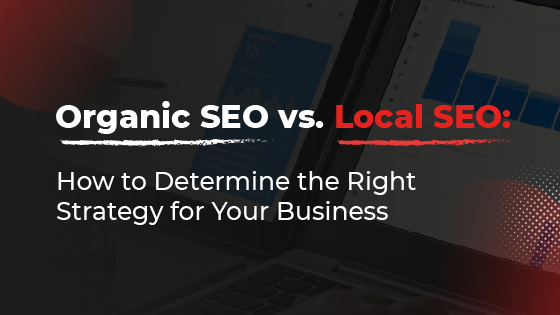
In today’s cutthroat markets, businesses must prioritize their search engine optimization (SEO) efforts to stand out, attract warm leads, and convert them into paying customers. At Ransom Ranker, we focus on two distinct types of SEO: Organic SEO and Local SEO, not just generic SEO. Each has its own set of advantages and disadvantages, and selecting the right strategy for your business can make all the difference. Choosing the wrong approach is akin to parking an ice cream truck at a landfill – squandering time and resources. In this blog post, we’ll delve into the distinctions between Organic and Local SEO, and offer practical advice to help you determine the optimal SEO strategy for your business.
Key Differences Between Organic SEO vs Local SEO
- Target Audience: Organic SEO focuses on reaching a broad audience across the internet without any geographic boundaries, using keywords and different search queries. In contrast, Local SEO targets local users searching for products or services within a specific physical area.
- Geographical Focus: Organic SEO is not tied to a specific location and aims to rank well for keywords across search engines globally. In contrast, Local SEO emphasizes ranking well for location-specific keywords, such as “plumber in Austin” or “dentist near me.”
- Keyword Research: For Organic SEO, keyword research involves identifying high-traffic, relevant keywords with low competition. Local SEO requires a focus on location-based keywords, including city names, neighborhoods, and “near me” phrases.
- Ranking Factors: Organic SEO considers factors like website structure, content quality, and backlinks, whereas Local SEO prioritizes factors like Google My Business listings, local citations, and customer reviews.
Evaluating Your Business Needs
Before deciding on an SEO strategy, consider the following:
- Assess Your Target Market: Determine if your business serves a local, national, or international audience. If you cater to a specific region or city, Local SEO might be the better choice.
- Analyze Competition: Look at your competitors’ online presence and SEO strategies. If there’s strong competition for organic rankings, focusing on Local SEO could provide a competitive advantage.
- Identify Your Unique Selling Proposition (USP): Understand what sets your business apart from the competition. Knowing your USP can help you identify keywords and phrases that best represent your brand and offerings, guiding your choice of SEO strategy.
Choosing the Right Strategy
To select the right SEO strategy, consider these factors:
- Business Type: If you have a brick-and-mortar store, service-based business, or cater to a specific geographic area, Local SEO is likely a better choice. For e-commerce or information-based websites targeting a broader audience, Organic SEO may be more effective.
- Resources: Implementing either SEO strategy requires time, effort, and financial investment. Assess your available resources and choose the strategy that aligns with your business goals and capabilities.
- Long-term Goals: Consider your long-term objectives. If you aim to expand your business nationally or internationally, you may want to focus on Organic SEO. However, if your goal is to dominate your local market, prioritize Local SEO.
Implementing Your Chosen Strategy
Once you’ve chosen your SEO strategy, follow these tips for success:
For Organic SEO:
- Create high-quality, informative content that targets your chosen keywords.
- Optimize your website for both desktop and mobile users.
- Build a diverse backlink profile from authoritative sources.
For Local SEO:
- Optimize your Google My Business listing with accurate information and images targeted for the location you are in.
- Build business/ local citations and ensure NAP consistency across all platforms.
- Encourage customers to leave reviews with keyword identifiers on Google and other review sites like Facebook and Yelp.
Conclusion
Selecting the right SEO strategy is crucial for maximizing online visibility and attracting your target audience. By understanding the differences between Organic and Local SEO, evaluating your business needs, and implementing the best-suited strategy, you can effectively compete in the digital space and drive growth for your business. Keep in mind that the online landscape is constantly evolving, and it’s essential to continuously evaluate and improve your SEO efforts to stay ahead of the competition. By staying adaptable and focusing on providing value to your target audience, your business will be well-positioned for long-term success in the world of SEO.
